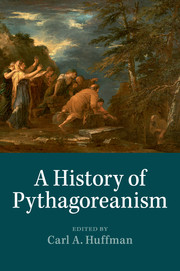
-
Select format
-
- Publisher:
- Cambridge University Press
- Publication date:
- 05 May 2014
- 24 April 2014
- ISBN:
- 9781139028172
- 9781107014398
- 9781316648476
- Dimensions:
- (228 x 152 mm)
- Weight & Pages:
- 0.88kg, 530 Pages
- Dimensions:
- (229 x 152 mm)
- Weight & Pages:
- 0.76kg, 532 Pages
You may already have access via personal or institutional login
Book description
This is a comprehensive, authoritative and innovative account of Pythagoras and Pythagoreanism, one of the most enigmatic and influential philosophies in the West. In twenty-one chapters covering a timespan from the sixth century BC to the seventeenth century AD, leading scholars construct a number of different images of Pythagoras and his community, assessing current scholarship and offering new answers to central problems. Chapters are devoted to the early Pythagoreans, and the full breadth of Pythagorean thought is explored including politics, religion, music theory, science, mathematics and magic. Separate chapters consider Pythagoreanism in Plato, Aristotle, the Peripatetics and the later Academic tradition, while others describe Pythagoreanism in the historical tradition, in Rome and in the pseudo-Pythagorean writings. The three great lives of Pythagoras by Diogenes Laertius, Porphyry and Iamblichus are also discussed in detail, as is the significance of Pythagoras for the Middle Ages and Renaissance.
Reviews
'… The book is remarkably comprehensive in its scope, and each chapter serves as a summary of primary texts and secondary scholarship on each respective subject. As a result, the volume is an excellent resource for specialists and novices alike. Anyone interested in the history of philosophy, of mathematics, of music and harmonics, or of the Pythagorean tradition as a whole should utilize this volume.'
Justin M. Rogers Source: Bryn Mawr Classical Review
Contents
Metrics
Altmetric attention score
Full text views
Full text views help Loading metrics...
Loading metrics...
* Views captured on Cambridge Core between #date#. This data will be updated every 24 hours.
Usage data cannot currently be displayed.
Accessibility standard: Unknown
Why this information is here
This section outlines the accessibility features of this content - including support for screen readers, full keyboard navigation and high-contrast display options. This may not be relevant for you.
Accessibility Information
Accessibility compliance for the PDF of this book is currently unknown and may be updated in the future.


